Member spotlight: Reskinned’s model for fashion resale, repair and recycling at scale (zero to landfill)
27/08/2025
UKFT member Reskinned is a circular solutions partner for fashion and footwear brands. From takeback programme design to recommerce and end-of-life recycling, the team delivers a single, data-led service that keeps product in use and out of landfill. Based in Canning Town in east London, Reskinned lists around 1,000 items a day and manages a live inventory of roughly 60,000 garments.
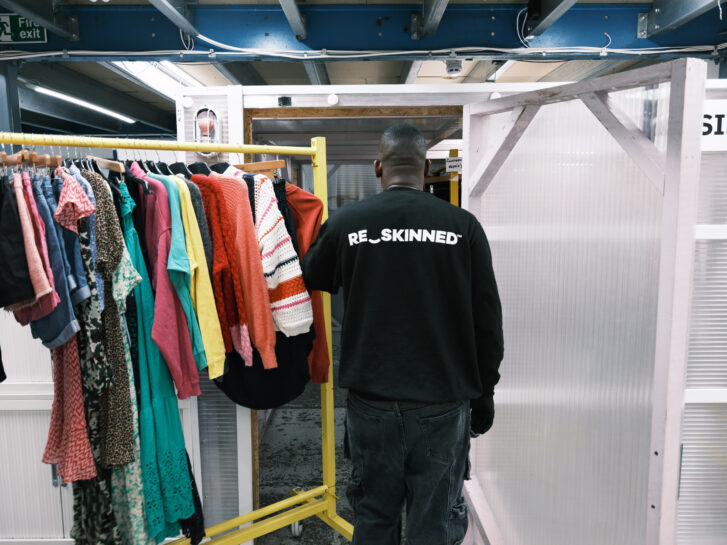
What Reskinned does
Reskinned designs and runs brand takeback programmes (online and in-store), receives returned items, hand-sorts and grades them, and then channels them to the highest-value next use:
- Resale: Items that make the resale grade are repaired where needed, ozone-sanitised (a zero-water process) and listed on Reskinned’s platform or on brand-approved marketplaces.
- Repurpose: Quality pieces that are not right for direct resale are upcycled or redirected to appropriate second-hand markets that match demand.
- Recycle: Non-reusable items are processed through responsible recycling, including mechanical routes for applications such as padding and insulation, and developing fibre-to-fibre solutions for cotton and certain blends.
Reskinned operates with 0% to landfill. Current routing averages are: 30% resale, 40% reuse elsewhere, 30% recycled.
Reskinned uses material composition scanners to identify fibres and blends, and has a proprietary system to assign SKUs to items that don’t have them. This ensures every garment can be tracked from start to finish (through grading, cleaning, repairs and resale or recycling). It also provides brands with a full dataset that can be used to report on sustainability, understand how their products perform in real use, and plan the growth of their circular programmes.

Who Reskinned works with
The company partners with over 30 brands and retailers, including Passenger, Nobody’s Child, Seasalt, Sweaty Betty, Oliver Bonas, Hush, Finisterre, Anthropologie, Tala, Kickers and Salt-Water Sandals. Reskinned also collaborates with upcycling designers such as E.L.V. Denim and Ahluwalia, and supports the next generation of fashion professionals by supplying garments and material to fashion colleges and universities.
Reskinned’s sister company is LMB Textile Recycling, which has over 20 years of recycling expertise and international reuse partners. This allows the company to offer a wide range of options for various materials and fibre types, as well as relevant recycling stories for brands (such as sportswear to punch-bag fill or countrywear to dog-bed fill).
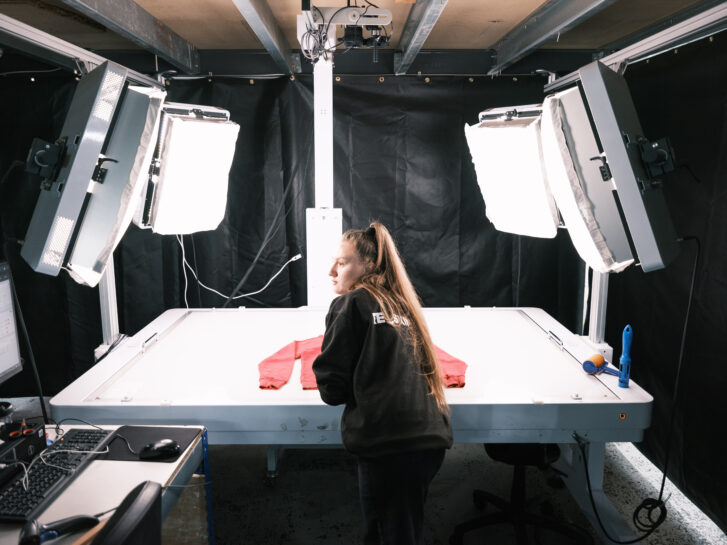
In numbers
In 2024 Reskinned’s takeback and recommerce operations delivered:
- 27,950 items received through takeback, each diverted from landfill or incineration
- 66,176 items rehomed through resale and reuse channels
- 709 repairs completed to extend product life
- 0% to landfill, with the 30/40/30 routing split across resale/reuse/recycling
Reskinned also offers on-site cleaning, garment care, repair services and photography to ensure consistent product quality and conversion.
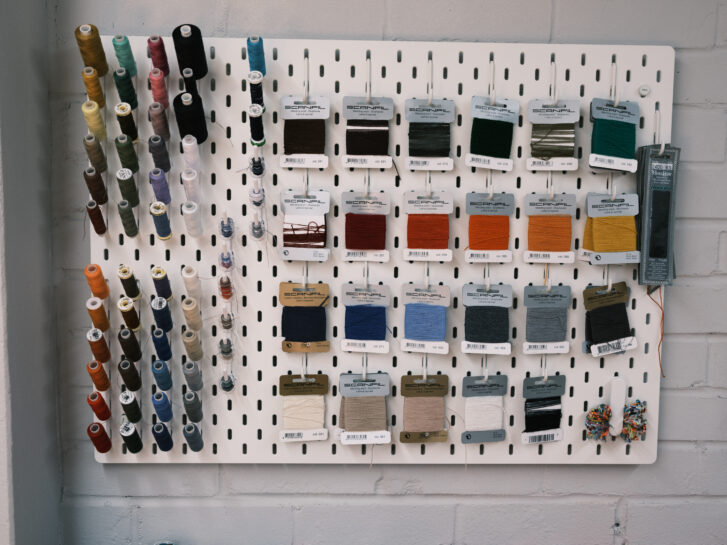
Recent developments
Denim finishing via LaundRe: Reskinned has partnered with LaundRe, a sustainable denim finishing hub located next door to its Canning Town facility. Reskinned supplies pre-loved, unprocessed denim as feedstock with LaundRe providing low-impact finishing. The proximity enables shared logistics, faster lead times and a traceable route from takeback to re-finished product.
B Corp certification: Reskinned became a Certified B Corporation in March 2025 with a score of 98.9 (minimum 80). The accreditation recognises governance, worker, community, environment and customer practices. Post-certification priorities include expanding the takeback network, strengthening UK recycling partnerships, improving impact tracking and reporting, and advancing a net-zero pathway aligned to 2050.
ACT UK project: As part of the ACT UK programme led by UKFT, Reskinned ran a postal take-back trial to test citizen pre-sorting of items into ready-to-reuse (RT) and not-ready-to-reuse (NRT). The campaign had a reach of approximately 18,405 with 5.5% engagement, with Reskinned sending out approximately 30 bags per month leading to 900+ garments received in total. The response was an average completion rate of 65% from online initiation to parcel return, with an average accuracy of 91% for NRT after post-sort checks and 72% for RT (which showed an improvement over the baseline with room to grow).
Insights showed that citizens can reliably identify many non-reusable faults, while categories such as “out of shape,” “bobbled,” and “faded” require clearer guidance.
Reskinned also led the Managing the Mountain roundtable, developing four sector recommendations now tabled to the ACT UK Consortium:
- ATSP feeder hubs to reduce costs and emissions and route RT for reuse while consolidating NRT for recycling.
- An ACT UK taskforce on EPR to ensure policy supports UK textile collectors, sorters and recyclers.
- Amplified design-for-recycling guidance beyond existing initiatives, with support for SMEs and graduates and robust comms to avoid greenwashing.
- Pre-research for a UK-wide behaviour change campaign to divert the approximately 49% of unwanted textiles currently placed in household bins, aligned with forthcoming “Simpler Recycling” reforms.

How to work with Reskinned
Reskinned starts by working with each brand to build a circularity roadmap. This sets out the goals and steps needed to keep products in use for longer and deal responsibly with items at the end of their life.
The first stage is takeback enablement. Reskinned sets up the technology, manages in-store and online collections, handles customer queries and provides prepaid logistics so returns are simple and efficient.
Next comes recommerce operations. Every item is checked and graded, cleaned using a water-free ozone process, and repaired where needed to brand-approved standards. Items are then photographed to a high standard and listed across the right sales channels, with Reskinned also managing fulfilment and returns.
Finally, if a garment cannot be resold or reused, Reskinned turns to recycling as a last resort. Through its sister company LMB and long-term partners, it uses around 20 different processes to ensure materials are reused in the most relevant way. This includes growing fibre-to-fibre recycling capacity for cotton and certain blends, helping move the industry closer to a fully circular system.
Brands use Reskinned for several practical reasons, explains co-founder Ross Barry. “First, our solution can help protect revenue by managing deadstock, quality control failures and damaged returns, allowing them to recover value before items are recycled. It also supports seasonal warehousing, timing resale drops to match seasonal demand and improve sell-through. For some of our partners, Reskinned can integrate with marketplaces, publishing listings on brand-approved channels like eBay in addition to our own platform, which extends reach and enhances value recovery. Finally, the data from takebacks provides design feedback, highlighting recurring faults and informing future product choices to improve durability and recyclability.”
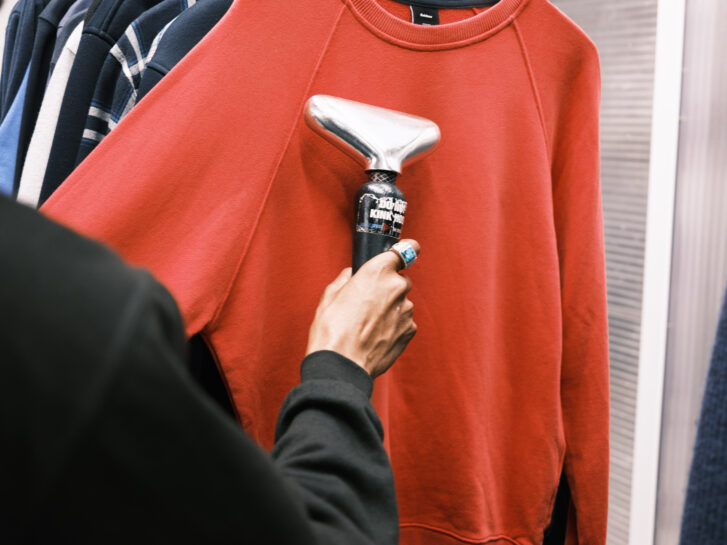
What’s next
In the months ahead, Reskinned will focus on growing local partnerships (like its work with LaundRe) to make reuse and recycling easier and more efficient. It has opened the Reskinned takeback programme to accept socks and underwear (which wasn’t the case before) so people have an option for end-of-life garments instead of throwing them in their household bins, while exploring new fibre-to-fibre recycling methods that can turn old garments back into raw materials. At the same time, Reskinned is improving how it tracks and shares data, so brands can better understand their products’ impact and meet both regulatory and voluntary sustainability goals.
The long-term aim is clear. Ross says: “We want to build a UK-wide system where resale, repair and recycling are not add-ons, but a normal part of how the fashion industry operates.
“For brands and retailers, we offer tailored support across takeback, resale and recycling. Our team can provide an impact baseline, set targets and deliver a practical roadmap to turn unwanted products into valuable resources.”
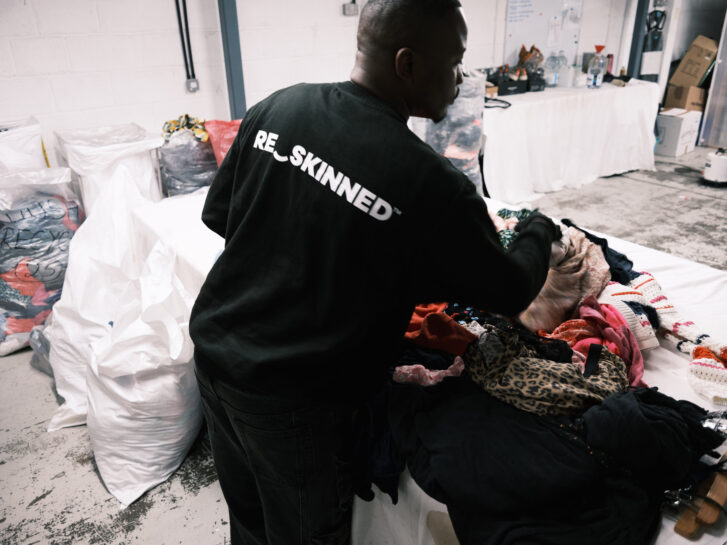
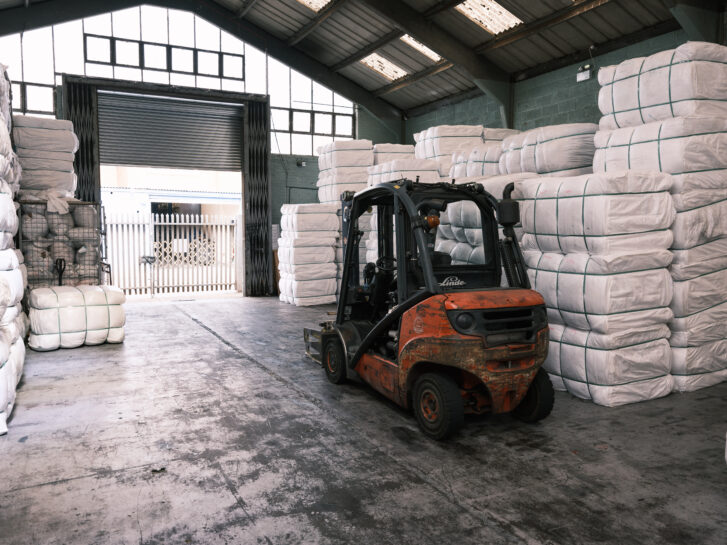
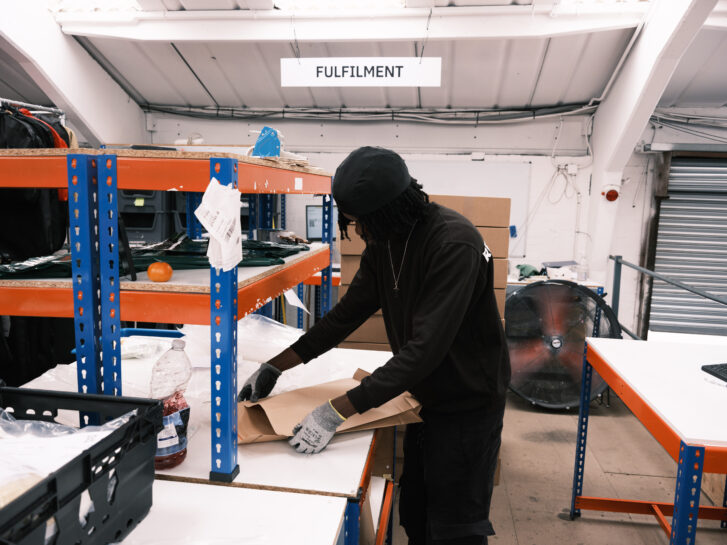
Reskinned is a member of UKFT. Not yet a member?
